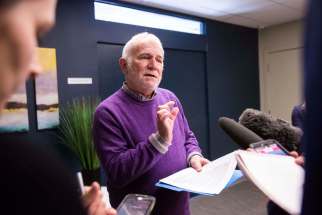Province promising more psychiatrists, shorter wait times to see one
Read this article for free:
or
Already have an account? Log in here »
To continue reading, please subscribe:
Monthly Digital Subscription
$0 for the first 4 weeks*
- Enjoy unlimited reading on winnipegfreepress.com
- Read the E-Edition, our digital replica newspaper
- Access News Break, our award-winning app
- Play interactive puzzles
*No charge for 4 weeks then price increases to the regular rate of $19.00 plus GST every four weeks. Offer available to new and qualified returning subscribers only. Cancel any time.
Monthly Digital Subscription
$4.75/week*
- Enjoy unlimited reading on winnipegfreepress.com
- Read the E-Edition, our digital replica newspaper
- Access News Break, our award-winning app
- Play interactive puzzles
*Billed as $19 plus GST every four weeks. Cancel any time.
To continue reading, please subscribe:
Add Free Press access to your Brandon Sun subscription for only an additional
$1 for the first 4 weeks*
*Your next subscription payment will increase by $1.00 and you will be charged $16.99 plus GST for four weeks. After four weeks, your payment will increase to $23.99 plus GST every four weeks.
Read unlimited articles for free today:
or
Already have an account? Log in here »
Hey there, time traveller!
This article was published 11/06/2019 (2373 days ago), so information in it may no longer be current.
Manitobans are waiting six months in Winnipeg or up to nine months in Western Manitoba to see a psychiatrist, as the province promises to ramp up training to drive down wait times.
The longest wait, a provincial spokesperson says, is in the northern part of Prairie Mountain Health region, where an adult seeking a referral might wait up to nine months due to “staffing challenges.”
As the province announced an expansion of Rapid Access to Addictions Medicine clinics Monday, it also promised to increase the number of psychiatrists practising in Manitoba with additional training opportunities — and reduce wait times.
Other coming changes
A report into Phase 2 of Manitoba’s health-care overhaul was released Monday. Some of its progress and recommendations:
A report into Phase 2 of Manitoba’s health-care overhaul was released Monday. Some of its progress and recommendations:
MyHealthTeams: The first report from Dr. David Peachey — the health-care consultant who came up with the blueprint for Manitoba’s current changes — suggested adding psychologists to care groups, called MyHealthTeams. That hasn’t been implemented in a few health regions (Interlake-Eastern, Northern, Southern Health) but in the Winnipeg Regional Health Authority, a part-time psychologist has had 32 referrals since last fall. In Prairie Mountain, which covers western Manitoba from the U.S. border to just north of Swan River, 2.8 full-time-equivalent community mental health workers are getting referrals.
Psychologists: In 2018, more than 3,000 WRHA patients saw a publicly funded psychologist for the first time, which doesn’t include ongoing treatment, other health agencies (such as New Directions, the Manitoba Adolescent Treatment Centre and Selkirk Mental Health Centre) or private psychology.
Expanding treatment: Crisis stabilization, tele-psychiatry and programs for forensic psychiatry, sexual assault, victimization and victims of assault.
Capacity: Increased ER facilities for mental-health patients, including locked units.
Inpatient beds: Consultant Dr. David Peachey notes recent delays in finding inpatient beds have increased ER visits for mental-health patients in recent months. But over the last four years, length of stay has decreased compared to expected length of stay, the report notes.
Source: Assessing Phase 2: Healing Our Health System
Delays can turn patients away — such as a Winnipeg woman who decided not to see a psychiatrist after being told it would take a year for a referral to a specialist in ADHD.
“If there hadn’t been such a long wait, I would have wanted to see a psychiatrist,” said the woman, who spoke with the Free Press on condition of anonymity. She had insurance to cover the cost of a diagnosis from a private psychologist, and found a medication that worked with the help of her family doctor.
As of 2017, the most recent data available, 179 psychiatrists were practising in Manitoba. That’s up from about 130 in 2011, when the Free Press reported wait times were creeping up from two months to five.
Between 2013-16, only 21 psychiatrists graduated from U of M; that number increased to 37 in the last three years. A provincial spokesperson said efforts to keep them in Manitoba are ramping up, including a residency program in Brandon.
There’s also a year-long wait for referrals to the Program of Assertive Community Treatment program, which is designed to address things such as frequent use of hospitals among patients with severe and persistent mental-health issues.
As the overhaul of Manitoba’s health-care system continues, a critical followup report released Monday, Assessing Phase 2: Healing Our Health System, suggests — among other changes to mental-health care — an accelerated expansion of the PACT program to keep up with rising rates of crystal meth use and addiction.‘When you don’t have (a diagnosis) you just feel really, really hopeless’ – Aly Raposo, Mood Disorders Association of Manitoba
Agencies including the Mood Disorders Association of Manitoba help fill in the gaps for people waiting for treatment, but seeing a psychiatrist is a critical first step.
“When you don’t have (a diagnosis) you just feel really, really hopeless,” said Aly Raposo, MDAM’s director of women’s and youth programming.

Once someone has a diagnosis, it’s easier to connect them to the right supports and help, she said.
Raposo said when she started seeking help at age 13, it took months to convince her family doctor to make a referral, and then she waited months for an appointment. During that period she relied on trips to the ER to manage severe panic attacks that felt to her like she was experiencing heart attacks.
After she got an appointment, Raposo says there was no followup, forcing her and her mother to navigate the complicated mental-health system on their own.
After a 2016 assault she got a referral, a year later, to a psychiatrist for a more fulsome diagnosis as an adult.
“I had to have something very traumatic happen to me to get to see the psychiatrist,” she said.
Longest waits
One year: Program of Assertive Community Treatment (77 patients waiting)
Nine months: northern portion of Prairie Mountain Health
Five to six months: Shared Care psychiatry (180 patients waiting)
15 weeks: Centralized Intake (312 patients waiting)
Three to four weeks: Early Psychosis Prevention and Intervention Service (nine patients waiting)
Source: Province of Manitoba
Raposo said she is encouraged by Monday’s announcement of funding for RAAM clinics, noting the spring 2018 VIRGO Planning and Evaluation Consultants’ report to the province suggests 60-80 per cent of the time patients are dealing with both mental health and addictions issues.
She says having more front-line service providers at the clinics will take some of the pressure off at the MDAM, which last week launched its own crystal-meth addiction program called Sparking Change with funding from the Winnipeg Jets Whiteout parties.
An extra $1.23 million in funding announced Monday will pay for more front-line and administrative staff at all five RAAM clinics (two in Winnipeg and in Brandon, Thompson and Selkirk). In Winnipeg and Brandon, there will also be dedicated hours for followup patients to return, which should open up more appointments for first-time patients, a provincial spokesperson said.
Raposo says it’s a great “stepping stone” and is optimistic about more changes to come.
Ultimately, Raposo said she’d like to see a system where instead of only treating acute problems, people with ongoing mental-health concerns could see psychiatrists more regularly.
“I would love to go get a new checkup, like a physical but for my brain, to see if there’s anything new, or if there’s anything old, or if there’s anything that’s missing,” she said. “For me it was… one talk, and there’s your diagnosis, so it’s always been a little unsettling.”
The province says it’s aiming to have 12 new psychiatrists graduate per year.
“The increased availability of psychiatrists dedicated to emergency consultations has led to a reduction in patient transfers between emergency departments and the Crisis Response Centre,” a provincial spokesperson said in an email Tuesday.
tvanderhart@freepress.mb.ca
@tessavanderhart










